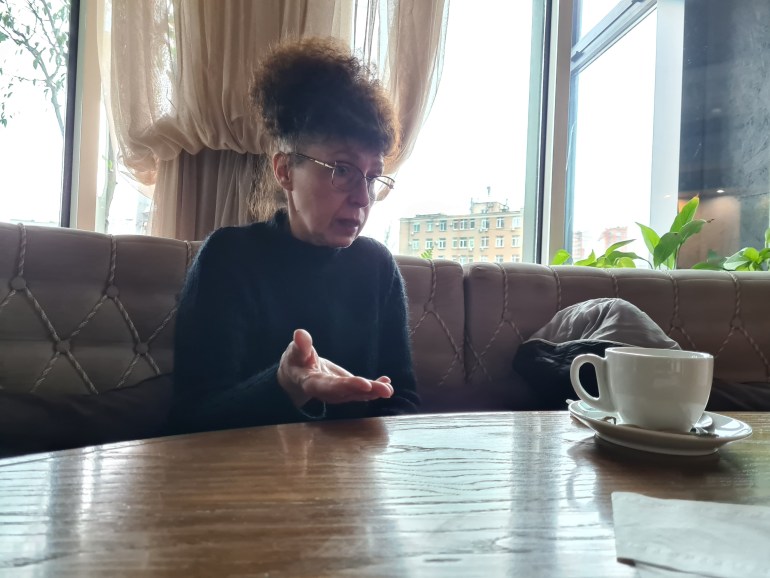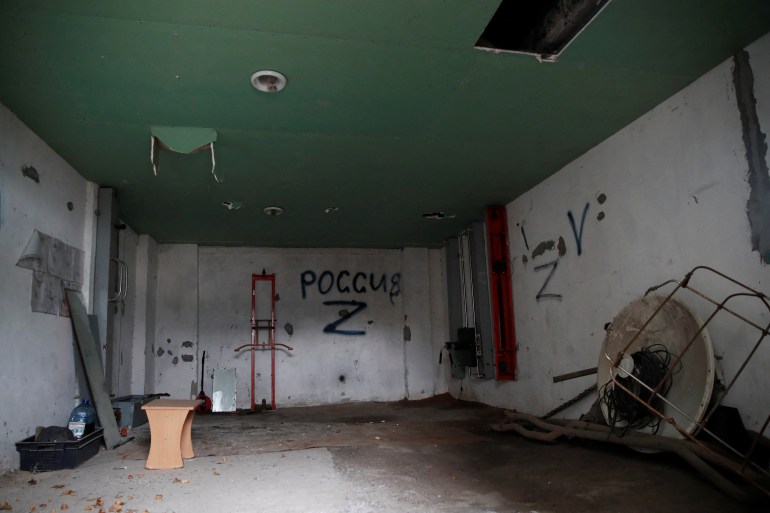Odesa, Ukraine – It was late August, greater than six months after Russian forces rolled into the southern Ukrainian metropolis of Kherson.
A Russian investigator advised Liliya Pshenichnaya, a single mom to a teenage lady, to signal a protocol stating that she was charged with “espionage”.
She confronted as much as 20 years in jail and would serve her sentence 500km (310 miles) northeast of her hometown of Kherson, in separatist-held Donetsk, the investigator stated.
“I advised him, ‘How can I signal it? I don’t think about myself responsible,’” Pshenichnaya, a bespectacled 58-year-old tailor hair advised Al Jazeera.
The investigator requested her to easily write down that she “learn the protocol”.
4 months earlier, Pshenichnaya managed to ship her 15-year-old daughter Alina to the Kyiv-controlled Black Sea port of Odesa.
In mid-July, 4 gun-toting Russian troopers blindfolded and took Pshenichnaya to a pre-trial detention centre following a search at an evangelical church close to her 16-storey condo constructing.
On the church, Pshenichnaya stated she helped distribute parcels with medical medicine delivered from Kyiv-controlled areas and sorted kids from an orphanage displaced by the invasion.
She by no means received any rationalization as to why she had been detained, nor did she see any proof detailing the alleged “espionage”.
She stated the longest interrogation was “about nothing”. Two Russian officers requested about her coiffure and have been curious whether or not feminine parishioners in her church needed to put on lengthy skirts and canopy their hair.
They assured her she can be launched “inside days”.
She was not.

Similar to many of the girls Pshenichnaya bunked with within the detention centre, she was not a political activist, public servant, servicewoman or a regulation enforcement officer.
She didn’t ship Google-pins with the whereabouts of Russian garrisons or arms depots to Ukrainian forces. Nor did she participate within the assassination of Moscow-appointed officers.
Many of the girls she shared the cell with have been rounded up randomly and confronted costs that observers have stated couldn’t maintain water even inside the judicial requirements Moscow transplanted to occupied Ukrainian areas.
Some have been launched quickly – a realtor who saved having panic assaults, and an apolitical girl rounded up in a restaurant, Pshenichnaya stated.
Some additionally confronted “espionage costs” – like a frightened 16-year-old lady who was rounded up whereas taking selfies on a park bench.
One other girl was driving her cancer-stricken mom from a hospital and stopped the automotive subsequent to a practice carrying tanks and ammunition.
Drunken Russian troopers requested her to purchase them mineral water. She didn’t have money – they usually reported her as a “spy”, Pshenichnaya stated.
A 72-year-old shepherd taking cattle residence was reportedly accused of planting trackers on Russian autos.
“They’ll jail you and overlook,” Pshenichnaya stated in Odesa, the place she relocated after Kherson’s liberation final November. “I didn’t know the best way to behave, the best way to remind them about me.”
A Kyiv-based analyst stated that “99 %” of detained Ukrainians have been held arbitrarily.
“Russians didn’t have main info and by no means managed to create their very own regulation enforcement community,” Aleksey Kushch advised Al Jazeera.
He in contrast the follow to the Oprichniki, an unbridled militia established by Russian Tsar Ivan the Horrible that grabbed individuals at whim to extract confessions within the wrongdoings that they had by no means dedicated.
“If somebody incriminates themselves underneath torture, then they’re probably responsible,” Kushch stated.

The follow dates again to 2014, when Moscow-backed separatists in Donetsk and Luhansk herded tons of of individuals to makeshift focus camps often known as “basements”.
“Detained for minor or imaginary transgressions, they have been saved for months and used for pressured labour or sexual violence,” Nikolay Mitrokhin, historian with Germany’s Bremen College, advised Al Jazeera.
The separatists pressured the detainees to dig trenches close to the entrance traces – and tried to “promote” them to family or pals for a ransom.
The detainees had no entry to legal professionals, have been held incommunicado, tortured and electrocuted, survivors stated.
The torture “goes on for hours, you lose the sense of time, and probably the most horrible factor is which you can’t cease it,” Ihor Kozlovsky, a spiritual scholar accused of “espionage, advised Al Jazeera in 2021.
Many have been sentenced to dying in accordance with the Stalinist-era “structure” adopted by the separatist statelets.
The follow was imported to the Ukrainian areas Russia occupied final yr, Mitrokhin stated.
The occupants have been rightfully afraid of underground Ukrainian brokers, however forged their nets too extensive.
Media Initiative for Human Rights, a Ukrainian rights group, stated in mid-April that it recognized virtually a thousand civilians which can be held in additional than 100 places within the occupied areas and Russia.
The actual quantity is far greater, it stated.
Threats and torture
Throughout her 60-day-long detention, Pshenichnaya typically felt determined and forgotten.
The pastor and parishioners from her church have been too scared to search for her, not to mention petition for her launch.
Her neighbour despatched her a parcel with freshly fried pies, cutlets, nail clippers, and a mirror, however the guards took every little thing, she stated.
Despite the fact that all the ladies jailed with Pshenichnaya have been pro-Ukrainian, only a few had performed one thing actually detrimental to the occupants.
They have been ceaselessly interrogated, threatened and tortured.
There was a college head trainer who refused to show in response to a Russian curriculum and a police officer who saved her service weapon after refusing to collaborate with the Russian-appointed “administration”.
One other police officer was coated in bruises and saved fainting after every interrogation, Pschenichnya stated.
The interrogators advised the officer they’d “dismember” her eight-year-old daughter and hand the mom “a chunk a day”.
Thankfully, the kid’s grandmother managed to get her out of Kherson, Pshenichnaya stated.
However after Russians retreated from town in November, they took many detainees with them, together with the officer.
Captured civilians are routinely relocated to annexed Crimea or Russia, so far as the jap Siberian metropolis of Irkutsk, in response to Media Initiative for Human Rights.
It stated Moscow refuses to supply details about these civilians and grants no entry to them to rights teams or worldwide screens.
And whereas Ukrainian prisoners of battle are listed and often swapped, getting captured civilians returned has been a lot tougher than, the group stated.
“We actually doubt that Russia will return the civilians,” the group’s Anastasiya Panteleyeva of advised a information convention in mid-April.

Pshenichnaya considered herself as fortunate.
A Russian intelligence officer who interrogated her in April took a shine to her and secured her launch in mid-October.
As soon as in her condo, she was afraid to go away. She didn’t get her telephone again and misplaced contact with the general public she knew.
Solely after Kherson’s liberation in November did she go away for Odesa, with a stitching machine and Feya [Fairy], a cat her daughter had rescued.
She longed to return residence, however the metropolis has been continuously shelled amid blackouts and shortages.
She felt powerless about altering her fortunes.
“It’s important to passively await one thing to be sorted out, and you may’t participate in it,” she stated.
However regardless of frequent shelling, Odesa felt protected.
“Right here, it’s only a disgrace to complain,” Pshenichnaya stated, earlier than returning residence to her daughter who’s on the brink of graduate from highschool and take college exams.
She desires to check internet design.
